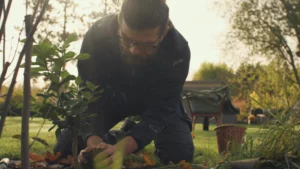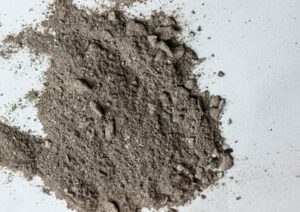BIOvative Magazine » All information about the OK compost INDUSTRIAL certificate
All information about the OK compost INDUSTRIAL certificate
- 23. January 2025
- Autor: Janine Friebel
- Lesezeit: 9 Minuten
Composting makes a crucial contribution to a sustainable waste disposal system. Products with the OK compost INDUSTRIAL certificate are guaranteed to be biodegradable and compostable in industrial composting plants. Here we explain what the certificate is all about.

OK compost INDUSTRIAL briefly explained
Key message of the OK compost INDUSTRIAL certificate
Products bearing the OK compost INDUSTRIAL certificate can be composted to at least 90 percent in industrial composting plants at a minimum of 55 to 60 degrees Celsius within three months. In addition, the product is biodegradable. When the product decomposes, water, carbon dioxide and a maximum of 10 percent of the original mass remain.
OK compost INDUSTRIAL offers you the following advantages
The certificate OK compost INDUSTRIAL is:
- a quality criterion for sustainable disposal
- a recognition aid indicating that the product is compostable
- a help for you to make sustainable sorting decisions when separating waste
Requirement for certification with OK compost INDUSTRIAL
- The product - with all its components - must be decomposed into small parts at 55°C to 60°C in industrial composting plants within 3 months.
- At the end of the decomposition process, after pressing through a 2-millimeter sieve, the fragments must not exceed 10 percent of the original mass.
- The remaining fragments must have been 90 percent biodegraded within 6 months. This means that only water, carbon dioxide and biomass remain.
- The composted product must be indistinguishable from the rest of the compost.
- The product must not release heavy metals or organic pollutants.
- The certification is based on the standards DIN 13432:2000 and the Packaging Directive 94162/EC.
What exactly does biodegradable and compostable mean? We explain this in our article “Biodegradable, compostable, recyclable – meaning and difference”.
Our certificate

Differentiation from other certificates
Other certificates in this area are:
- OK compost HOME
- Keimling according to EN 13432
- in Germany the certificate "DIN-geprüft gartenkompostierbar" awarded by DIN CERTCO
Examples of products with the OK compost INDUSTRIAL certificate
Possible certification bodies
- TÜV Austria
- DIN CERTCO
OK compost INDUSTRIAL: What lies behind the certificate
The OK compost INDUSTRIAL certificate is based on the standards DIN EN 13432:2000 and the EU Packaging Directive 94162/EC. Products made of bioplastics that can be composted in industrial composting plants at temperatures of at least 50 to 60 degrees Celsius within 3 months are certifiable. This includes not only the product itself, but also all components of the product. This includes inks, additives, labels and adhesives. Within three months, at least 90 percent of these products must biodegrade, leaving only water, carbon dioxide and biomass.
Products with the OK compost INDUSTRIAL certificate can thus be disposed of in a sustainable manner and are even profitably recycled for agriculture through composting.
Why composting contributes positively to waste disposal is also explained in this video:
This means compostable in the test process
A product is considered compostable if it is decomposed solely by microorganisms and enzymes under specified conditions and within a fixed, determinable period of time into carbon dioxide, water and no more than 10 percent of its original mass without leaving toxic residues.
OK compost INDUSTRIAL: Requirements for products
For certification with OK compost INDUSTRIAL, a product must be decomposed into small parts at 55 to 60 degrees Celsius in an industrial composting plant within 3 months. The fragments must also be at least 90 percent biodegraded within 6 months, i.e., decomposed into water, carbon dioxide and biomass.
The composting process must also not release any organic pollutants or heavy metals.
To track this, four tests are carried out:
- the biodegradation test, i.e. the test whether the polymer can be chemically decomposed
- the test for disintegration, i.e. the physical decay of the product
- the ecotoxicity is checked
- the content of heavy metals and organic pollutants is also tested
During the chemical test, it is verified whether all ingredients are traceable and whether the limit values for pollutants are complied with. It also tests whether the material biodegrades to at least 90 percent into water, carbon dioxide and biomass within 6 months under the influence of oxygen.
The disintegration test verifies the compostability of the product. The composting process is considered successful when the fragments resulting from the decomposition process pass through a 2-millimeter sieve and can no longer be distinguished from the rest of the compost.
The material must not have a negative impact on composting or compost quality in a composting facility. This also means that the product must not release toxins into the environment during the decomposition process and must not negatively affect plant growth.
If these criteria are met for all components of the product, it receives the OK compost INDUSTRIAL certificate.
Differences between the OK compost certificates and the Keimling according to EN 13432
In addition to OK compost INDUSTRIAL, there are two other certificates: OK compost HOME and the EN 13432 certificate, also known as keimling. All three certificates are seals for products made from sustainable bio-plastics.
Two of these certificates were created by TÜV Austria: OK compost INDUSTRIAL and OK compost HOME. Products marked with OK compost HOME are compostable even at low temperatures. You can therefore dispose of them in your garden compost. So the difference between the two certificates is based on the condition and place for composting.
The Keimling is an international trademark, which is awarded exclusively on the basis of the DIN EN 13432 standard. Thus the Keimling and OK compost INDUSTRIAL have in parts the same standard basis. However, the Keimling does not have to comply with the EU Packaging Directive.
BIOvative products with OK compost INDUSTRIAL certificate
Our organic bags produced in Germany from sustainable, European raw materials are an example of a product with the OK compost INDUSTRIAL certificate. They are fully compostable and biodegradable and therefore certified with both OK compost INDUSTRIAL and OK compost HOME and the Keimling as well as the DINplus seal. However, the bio bags will not remain our only sustainable and recyclable products.
If you don’t want to miss any of our new products, subscribe to our newsletter and follow us on social media!

Janine Friebel

Janine Friebel
These articles may also interest you

Our promise
Sustainability is on everyone’s lips and has never been as relevant as it is today. If you’re rolling your eyes right now because you’re sick

ash
Can ash be put in the organic waste bin? No, ash doesn’t belong in the organic waste bin. In general, ash, whether wood ash from

bread
Can bread go in the organic waste bin? Bread consists mainly of flour and is therefore a natural, organic food. As such, it is biodegradable


